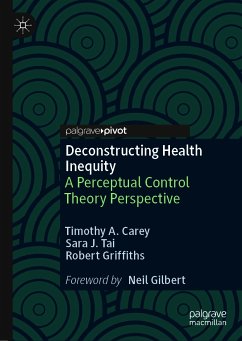This book offers a radically different perspective on the topic of health inequity. Carey, Tai, and Griffiths use Perceptual Control Theory (PCT) to deconstruct current approaches to understanding, investigating, and addressing problems of health inequity. In the book, the authors propose that health inequity is not a problem per se. Disrupted control, they argue, is the problem that needs to be addressed.
From this perspective, research, policy, and health practices directed at addressing health inequity in isolation will offer only partial solutions to the problems created by disrupted control. Addressing problems of disrupted control directly, however, has the potential to entirely resolve issues that are created by health inequity.
The authors have extensive clinical and research experience in a wide range of contexts, including: cross-cultural settings; rural, remote, and underserved communities; community mental health settings; prisons; schools; and psychiatric wards. Drawing on these diverse experiences, the authors describe how adopting a Perceptual Control Theory perspective might offer promising new directions for researchers and practitioners who have an interest in addressing issues of inequity and social justice. With a Foreword written by Professor Neil Gilbert this book will provide fresh insights for academics, practitioners, and policymakers in the fields of public health, psychology, social policy, and healthcare.
Hinweis: Dieser Artikel kann nur an eine deutsche Lieferadresse ausgeliefert werden.
From this perspective, research, policy, and health practices directed at addressing health inequity in isolation will offer only partial solutions to the problems created by disrupted control. Addressing problems of disrupted control directly, however, has the potential to entirely resolve issues that are created by health inequity.
The authors have extensive clinical and research experience in a wide range of contexts, including: cross-cultural settings; rural, remote, and underserved communities; community mental health settings; prisons; schools; and psychiatric wards. Drawing on these diverse experiences, the authors describe how adopting a Perceptual Control Theory perspective might offer promising new directions for researchers and practitioners who have an interest in addressing issues of inequity and social justice. With a Foreword written by Professor Neil Gilbert this book will provide fresh insights for academics, practitioners, and policymakers in the fields of public health, psychology, social policy, and healthcare.
Dieser Download kann aus rechtlichen Gründen nur mit Rechnungsadresse in A, B, BG, CY, CZ, D, DK, EW, E, FIN, F, GR, HR, H, IRL, I, LT, L, LR, M, NL, PL, P, R, S, SLO, SK ausgeliefert werden.
Hinweis: Dieser Artikel kann nur an eine deutsche Lieferadresse ausgeliefert werden.
Es gelten unsere Allgemeinen Geschäftsbedingungen: www.buecher.de/agb
Impressum
www.buecher.de ist ein Internetauftritt der buecher.de internetstores GmbH
Geschäftsführung: Monica Sawhney | Roland Kölbl | Günter Hilger
Sitz der Gesellschaft: Batheyer Straße 115 - 117, 58099 Hagen
Postanschrift: Bürgermeister-Wegele-Str. 12, 86167 Augsburg
Amtsgericht Hagen HRB 13257
Steuernummer: 321/5800/1497
USt-IdNr: DE450055826
Bitte wählen Sie Ihr Anliegen aus.
Rechnungen
Retourenschein anfordern
Bestellstatus
Storno









